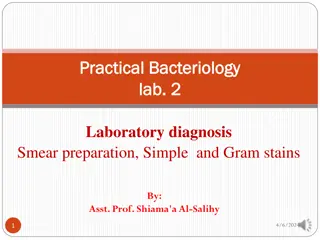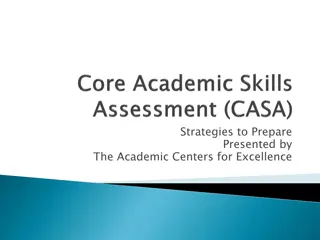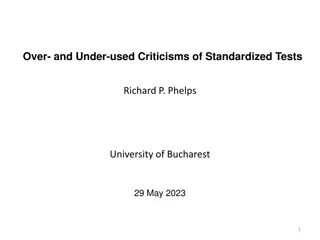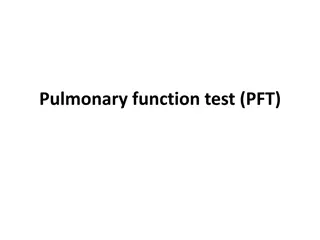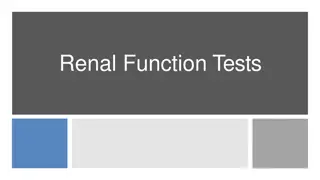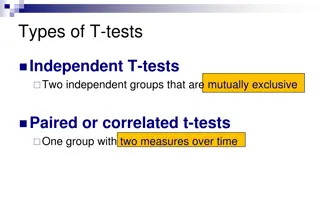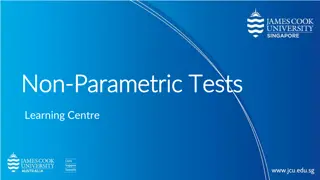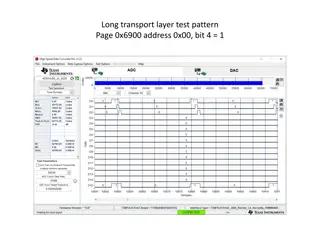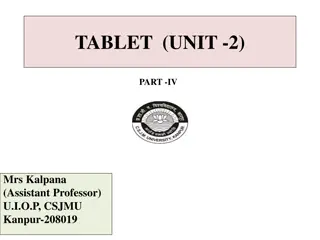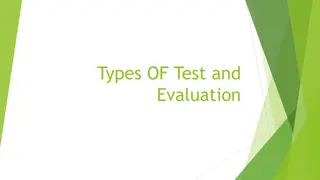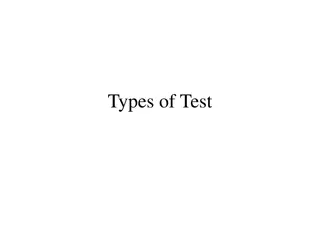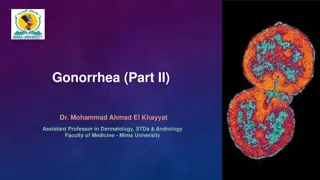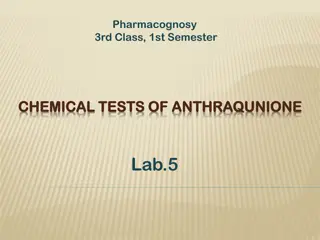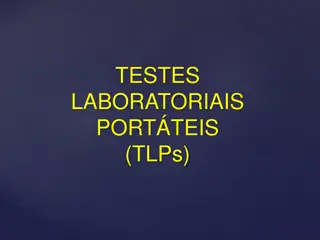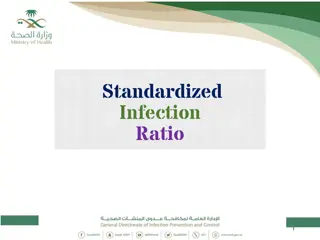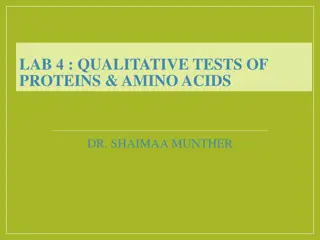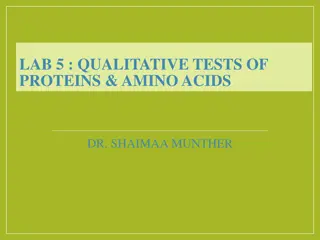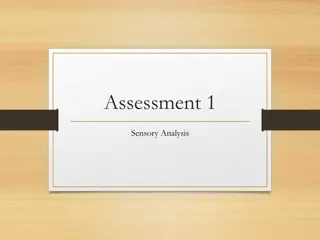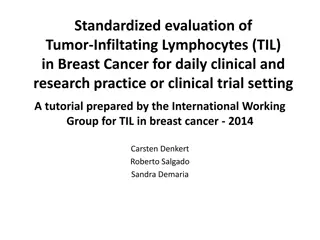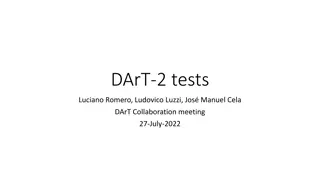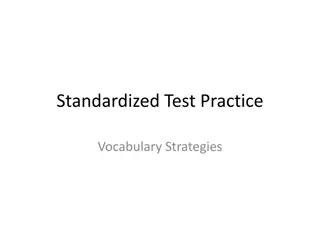Construction of an Achievement Test
Learn about achievement tests, standardized tests, oral tests, essay tests, and more for student evaluation. This guide discusses various types of tests and their purposes in assessing student learning. Enhance your understanding of educational assessment methods with this comprehensive resource
0 views • 29 slides
Practical Bacteriology Laboratory Diagnosis and Sample Collection
This practical guide focuses on laboratory diagnosis steps in bacteriology, covering specimen collection, microscopic examination, culture tests, biochemical tests, serological tests, and molecular tests. Learn about various sample collection methods for urine, stool, swabs, sputum, pus, CSF, and mo
3 views • 23 slides
Effective Test Taking Strategies for Standardized Tests
Explore various tips and strategies for succeeding in standardized tests, including types of tests, preparation techniques, dealing with distractions, managing anxiety, understanding exam formats, and strategies for multiple choice questions. Discover insights into what research indicates about succ
8 views • 30 slides
Effective Strategies for Standardized Test Preparation
Discover helpful strategies presented by the Academic Centers for Excellence to prepare effectively for standardized tests like the CASA. Learn how to identify and address areas of weakness, utilize resources, study systematically, and practice successful test-taking techniques. Explore preparation
2 views • 5 slides
Insights on Standardized Test Criticisms and Testing Effects
This presentation discusses both overused and underused criticisms of standardized tests, highlighting issues such as time lost from learning, narrowing of the curriculum, and the testing effect on student learning. It delves into the benefits of testing and presents findings on the impact of testin
1 views • 48 slides
Standardized Testing:. The Interplay of Achievement & Aptitude Testing
Explore the evolution of standardized testing, from the ancient Chinese civil service exam to modern achievement and aptitude tests. Discover the purposes, development, and validation methods of achievement and aptitude tests, shedding light on their role in assessing mastery of content or skill and
9 views • 41 slides
Understanding Bial's & Seliwanoff's Tests in Clinical Chemistry
Bial's and Seliwanoff's tests are chemical tests used to detect the presence of pentoses in a sample, distinguishing them from hexoses. These tests involve specific reactions with reagents to produce distinct color changes based on the type of sugar present. The Bial's test, particularly sensitive t
0 views • 17 slides
M O N I T O R T R A I N I N G F L O R I D A S TAT E W I D E A S S E S S M E N T S
Monitoring and Assessment Overview for Florida's Statewide Assessments (ARDA) in Spring 2023 encompass a range of standardized tests administered across districts to ensure test integrity and validity. Tests include FSA, FAST, NGSSS, and B.E.S.T., covering ELA, Math, and Science for various grade le
0 views • 30 slides
Understanding SOLs: Information for Parents at Lees Corner - Spring 2022
SOLs, or Standards of Learning tests, are standardized assessments in Virginia to measure student mastery of grade-level content. These tests are essential for graduation requirements, school effectiveness evaluation, and meeting both federal and state testing mandates. Students are tested on variou
1 views • 12 slides
Comprehensive Overview of Pulmonary Function Tests (PFTs)
Pulmonary Function Tests (PFTs) are vital for assessing pulmonary gas exchange through ventilation, diffusion, and lung perfusion. These tests include measurements of lung volume, airway patency, gas exchange efficacy, and pulmonary blood flow. PFTs offer benefits in diagnosing dyspnea, monitoring d
0 views • 14 slides
Understanding Verbal and Non-Verbal Tests
Verbal and non-verbal tests serve different purposes in assessing intelligence and skills. Non-verbal tests utilize images and diagrams to measure reasoning abilities without requiring reading or writing. Verbal tests, on the other hand, assess language-based skills through reading, writing, or oral
0 views • 14 slides
Understanding Renal Function Tests and Kidney Health
Renal function tests are essential for diagnosing and monitoring kidney health. These tests assess functions like glomerular filtration, tubular reabsorption, and endocrine functions of the kidneys. Common indicators include serum urea, creatinine levels, and more. It's crucial to evaluate renal fun
0 views • 34 slides
Understanding Different Types of T-Tests in Psychological Research
This article provides an overview of different types of t-tests used in psychological research, including independent t-tests for comparing two groups, paired or correlated t-tests for within-group comparisons, and the assumptions behind conducting these tests. It also includes examples of when to u
1 views • 7 slides
Understanding Non-Parametric Tests and Their Applications
Non-parametric tests serve as valuable alternatives to parametric tests when data do not meet specific criteria. This article explores the concept of non-parametric tests, types of non-parametric tests, and provides insights on conducting the Mann-Whitney U Test using SPSS for practical research app
4 views • 32 slides
Long Transport Layer Test Patterns for Data Evaluation
Explore various test patterns for data evaluation purposes including long transport layer tests, ADC data reverse order tests, 12-0ctet RPAT tests, and D21.5 tests. These patterns involve specific addresses and data configurations that need to be established before usage with TSW14J57EVM. Each patte
0 views • 4 slides
Quality Control Tests for Tablet Production
Quality control tests play a crucial role in ensuring the safety and efficacy of tablet products. This article discusses various parameters like general appearance, size, shape, unique identification markings, organoleptic properties, hardness, friability, weight variation, and content uniformity th
1 views • 11 slides
Understanding Structured and Standardized Assessments in Education
Explore the world of structured and standardized assessments with a focus on their role, purpose, and administration. Learn about important factors in selecting measures, interpreting results, and evaluating validity and reliability. Discover the benefits and advantages of standardized measures in e
0 views • 30 slides
Understanding Types of Test and Evaluation in Education
Explore the various types of tests used in education, including pre-tests, mastery tests, and diagnostic tests. Learn about different mediums for testing, such as oral, written, and performance tests. Discover the role of examinees in essay-type and objective-type tests. Lastly, delve into different
1 views • 13 slides
Understanding Achievement and Aptitude Tests in Education
Explore the differences between achievement and aptitude tests, such as how they measure abilities and knowledge. Learn about teacher-made tests, standardized tests, low-stake, and high-stake tests. Discover the importance of achievement tests in evaluating present proficiency and aptitude tests in
1 views • 16 slides
Gonorrhea Diagnostic Methods and Tests Overview
Dr. Mohammad Ahmad El Khayyat, an Assistant Professor in Dermatology, STDs, and Andrology, details the diagnostic methods and tests for gonorrhea. Various tests including Gram stain, culture, antigen detection tests, and nucleic acid amplification tests are discussed, highlighting sensitivity and sp
1 views • 30 slides
Chemical Tests of Anthraquinone in Aloe Vera Extract
This laboratory experiment focuses on conducting chemical tests to identify anthraquinone glycosides in Aloe vera extract. The tests include Schoneten's reaction (Borax test) and Bromine test for aloin, providing specific reactions for the presence of these compounds. Additionally, special reagents
1 views • 12 slides
Understanding Achievement Tests in Education
Achievement tests play a crucial role in assessing student progress in schools, aiding curriculum planning, and evaluating teaching programs. These tests measure individual accomplishments after a period of learning, helping to determine the effectiveness of instruction. Characteristics such as reli
2 views • 30 slides
Understanding Psychological Testing: Key Concepts and Applications
Psychological testing encompasses various measures to assess intelligence, abilities, aptitudes, personality traits, and more. These tests are standardized to ensure reliability and validity, providing valuable insights into an individual's psychological profile. Key concepts include mental ability
2 views • 18 slides
Integrated Language Tests and Assessments Overview
This content delves into integrated language tests and assessments, exploring the differences between separate skills tests and integrated tests. It covers the rationale behind integrating language skills, examples of integrated skills tests, as well as shortcomings to avoid in test design. Key aspe
2 views • 35 slides
Understanding Portable Laboratory Tests (TLPs)
Portable laboratory tests (TLPs) bring convenience but must not compromise quality and safety. Errors in the TLP process can impact patient safety, and the simplistic notion of error-proof TLPs is misguided. Quality and safety standards for TLPs should not be shifted to society, and performing tests
0 views • 40 slides
Quality Control Tests for Pharmaceutical Packaging Materials
This article discusses quality control tests for pharmaceutical packaging materials focusing on glass containers. The tests include chemical resistant tests such as powdered glass test and water attack test, as well as hydrolytic resistance tests. Detailed procedures for each test are outlined along
3 views • 18 slides
Importance of Collecting Standardized Social Determinants of Health Data
Health centers are focusing on collecting standardized social determinants of health (SDOH) data to address the needs of individual patients and promote social justice. This systematic approach involves gathering qualitative data for every patient, structured data via screening tools, and standardiz
0 views • 28 slides
Understanding Standardized Infection Ratio (SIR) in Healthcare
The Standardized Infection Ratio (SIR) is a crucial metric used to monitor Healthcare-Associated Infections (HAIs) at various levels. It allows for improved risk adjustment and comparison by providing a single summary number. Standardization methods like direct and indirect standardization help in a
0 views • 44 slides
Importance of Standardized Recipes in Restaurants
Standardized recipes ensure consistent quality, presentation, and customer satisfaction in restaurants. By following standardized formats, establishments can control costs, inventory, labor, and maintain consistency in their offerings. This leads to improved efficiency, reduced errors, and streamlin
0 views • 14 slides
Guide to Locating and Selecting Psychological Tests
Discover considerations and methods for locating and selecting psychological tests, including dimensions to evaluate, sources of information, standardized tests, and a homework task to locate non-standardized tests.
0 views • 8 slides
Understanding Smarter Balanced Assessment: English and Math Tests
Explore examples of smarter questions in computer adaptive tests for English and Math across different grade levels, focusing on the Oregon Assessment of Knowledge and Skills. The images provide insights into the types of questions and skills assessed in these standardized tests.
0 views • 22 slides
Qualitative Tests of Proteins & Amino Acids: Overview and Analysis
In this lab, you will delve into the qualitative tests for proteins and amino acids, understanding their structures, classifications, and importance in food and human nutrition. The tests include solubility tests and identification tests for both amino acids and proteins, revealing their presence an
0 views • 13 slides
Qualitative Tests of Proteins & Amino Acids - Lab Analysis Overview
This lab analysis covers qualitative tests for proteins and amino acids, including solubility tests and identification tests for amino acids and proteins. Specific tests like Ninhydrin test for -L amino acids, Xanthoproteic test for aromatic amino acids, and lead sulfite test for sulfhydryl group de
0 views • 13 slides
Sensory Analysis Tests in Food Evaluation
Explore different sensory analysis tests used in food evaluation, including paired comparison tests for sweetness, quantitative descriptive analysis for taste attributes, and affective tests like hedonic tests. Understand the purpose and methodology of each test to enhance product development and qu
0 views • 12 slides
Tutorial on Standardized Evaluation of Tumor-Infiltrating Lymphocytes in Breast Cancer
This tutorial, prepared by the International Working Group for TIL in breast cancer, provides guidelines for pathologists on the standardized evaluation of tumor-infiltrating lymphocytes (TILs) in breast cancer based on H&E slides of core biopsies or tumor resections. It details steps such as defini
0 views • 14 slides
DArT-2 Tests and Experiments Overview
The DArT-2 tests involve twin experiments - DArT-2 and DArT-Test, focusing on ensuring the performance of DArT-2 in studying underground argon. Various tests like electronic tests of the PDM and vacuum tests are conducted to guarantee proper operation. Challenges with vacuum sealing and solutions li
0 views • 8 slides
Vocabulary Strategies for Standardized Test Practice
Understanding denotation and connotation, utilizing context clues effectively, and deciphering words with multiple meanings are crucial strategies for mastering vocabulary in preparation for standardized tests. This guide provides detailed explanations and examples to enhance your vocabulary skills.
0 views • 20 slides
Understanding the Differences Between Objective and Projective Tests
Objective tests aim to maximize objectivity by providing structured response options, while projective tests delve into hidden emotions and conflicts through ambiguous stimuli. Pros of objective tests include standardization and reliability, but projective tests offer unique insights based on indivi
0 views • 10 slides
Understanding Unit Testing in Software Engineering
Concept Software is a discipline comprising various code pieces. Testing these codes together is complex but vital in Software Engineering. The process includes early testing like unit tests, pairwise/multiple component testing, module testing, integration testing, user tests, alpha tests, beta test
1 views • 6 slides
Understanding Standardized Testing: Facts, Myths, and Strategies
Criticism of standardized testing is a long-standing issue. This research team delves into the world of standardized tests such as ACT, SAT, GMAT, GRE, and PRAXIS exams to explore their impact on student success. They investigate the necessity of standardized testing, factors affecting performance,
0 views • 23 slides

